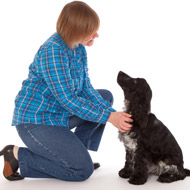
University of Lincoln issues guidance to owners whose pets cannot exercise due to surgery or illness
The University of Lincoln has announced the publication of a new book which provides help and guidance for dog owners whose pets are unable to exercise to to surgery or illness.
Written by animal behaviour experts Sian Ryan and Helen Zulch, the book aims to help owners identify the needs of their dog and offers support in preparing their animal for a period of restricted exercise, such as after surgery.
The guidance also aims to help owners manage their dogs during illness, in the recovery stage post-surgery, or in the longer term if the injury or illness means that activity is permanently restricted.
It is hoped that the advice will ease the stress that many owners and their dogs experience when usual exercise is limited - which can lead to behavioural changes in the animal. Until now, very little help has been available and owners have been left to manage as best they can.
The book offers tips and ideas for dog owners to provide mental stimulation and emotional support for there pets, and provides alternatives to physical exercise and provides guidance on specific skills.
A certified professional clinical animal behaviourist, Helen Zulch is based in Lincoln's School of Life Sciences where she undertakes research, lectures and sees cases in the University of Lincoln Animal Behaviour Referral Clinic.
Commenting on the book, Helen said: “Over the years I have consulted with a number of owners of dogs that are struggling to come to terms with a restriction of their physical activity, or where these restrictions have led to the development of serious behaviour problems. I hope that this book will be of use to dog owners as well as the professionals assisting them and will ultimately improve these dogs’ quality of life.”
With an MSc in Clinical Animal Behaviour, Sian Ryan has worked in the behavioural clinic at the University of Lincoln and as a researcher in dog behaviour.
Sian said: "I have fostered dogs for several rescue organisations, including a 12-week old sighthound puppy which had been abandoned at a veterinary surgery with a badly broken leg. This puppy – of typically high energy and in need of exercise and socialisation – required nine months of care and rehabilitation, and was the catalyst for writing this book.”
No Walks? No Worries! (2014) by Sian Ryan and Helen Zulch is published by Hubble & Hattie.
Image (C) Peter Baumber/University of Lincoln



 The Veterinary Medicines Directorate (VMD) is inviting applications from veterinary students to attend a one-week extramural studies (EMS) placement in July 2026.
The Veterinary Medicines Directorate (VMD) is inviting applications from veterinary students to attend a one-week extramural studies (EMS) placement in July 2026.